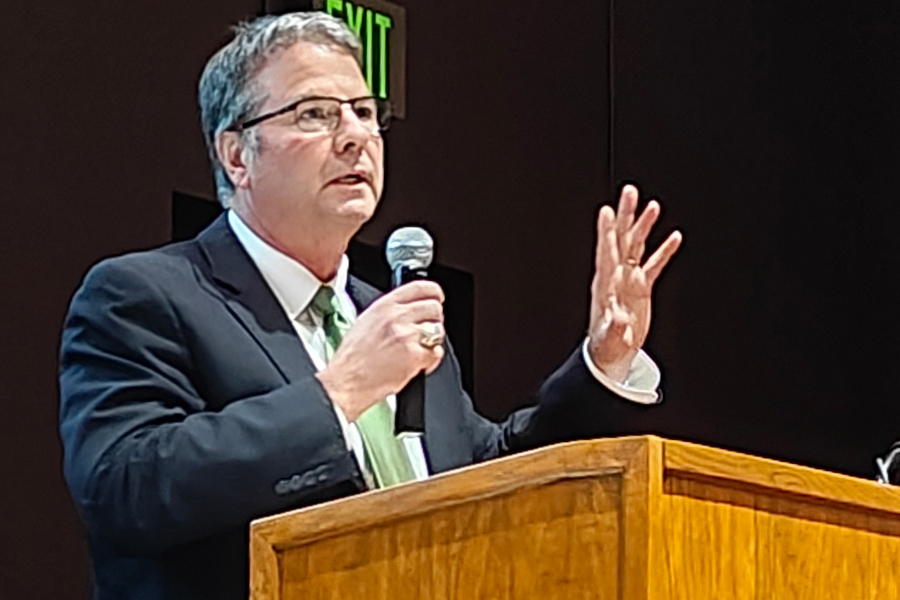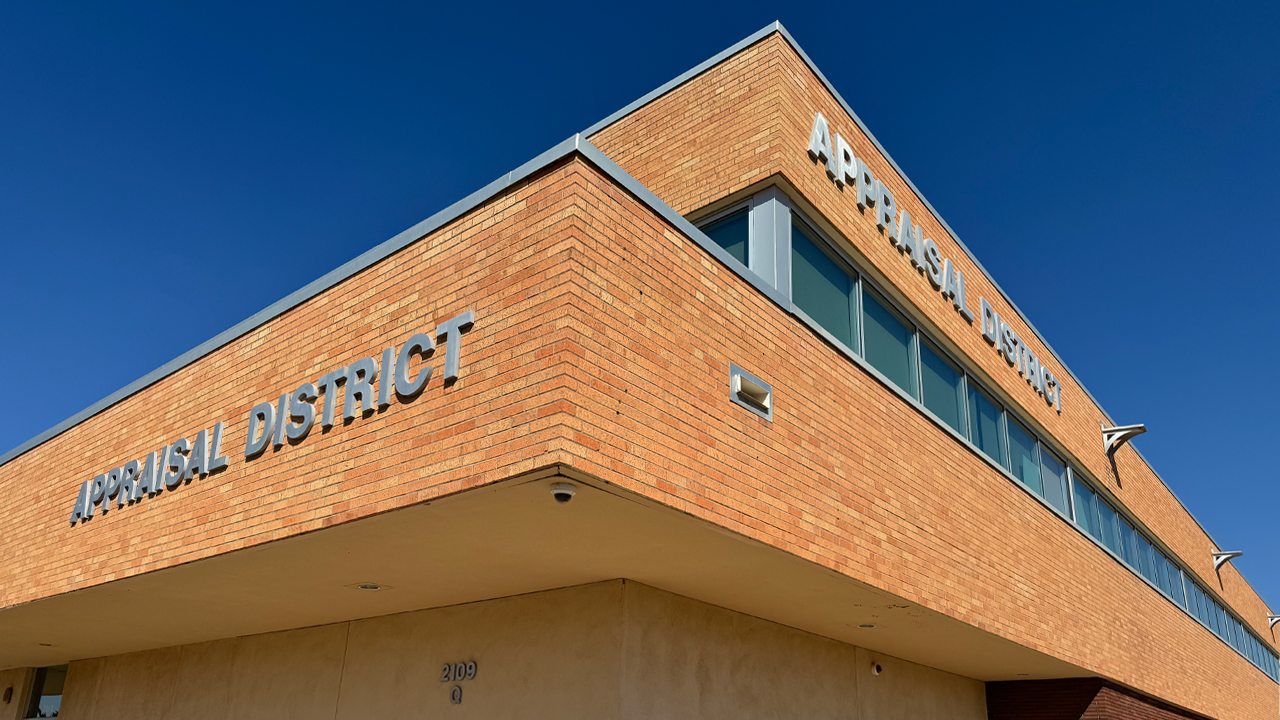A new member of the Lubbock Central Appraisal District board wants to change annual appraisals to every other year – saying it will cut down on protests in a county where taxable property values (including new construction) have increased 53 percent since 2019.
The board’s majority disagrees – for now – believing the current process works. Plus, school districts are worried the change could hurt their funding.
How we got here
Under pressure from angry voters, Gov. Greg Abbott brought the Legislature back in special session last year to address property tax reform among other issues.
A new law for counties with 75,000 people or more added three elected members to appraisal district boards. It also added the county tax assessor-collector as a non-voting member.
Micah O’Hair, Jim Baxa and Tom Keisling were elected earlier this year, joining the board in July.
Previously, board members had all been appointed by the government agencies that are members of the appraisal districts. The five appointed members still outnumber the three elected members.
O’Hair applauded the change, saying previous boards were looking out for schools and cities but not taxpayers.
Now he’s looking to make local changes.
By the numbers – last 5 years
The taxable value of property in Lubbock County went from $22.6 billion in 2019 to $34.6 billion this coming year.
Some of that is from new construction. The number of single-family homes went from 87,410 in 2019 to 95,278 in 2023 (the most recent numbers available from the LCAD website).
At the same time, the Consumer Price Index calculator on the U.S. Government website said $100 in August 2019 would be equal to $122.70 this past August.
Will every-other-year appraisals reduce protests?
“Things have gotten out of control to the point where the citizens need a break. It’s just reached a fever pitch. It’s got enough people upset that you hear a lot about it,” O’Hair said.
Roughly 30,000 property owners – about 18 percent across the county – filed a protest on their tax values this year with the district. Last year it was nearly 29,000.
O’Hair thinks appraisals every two years instead would cut the number of protests in half and “reduce friction” between the district and the public.
As an example, assume half the protests win, he said.
The following year, no one gets a higher value under his plan because there are no valuations at all (except new construction or major renovations).
“You have literally cut the interactions with LCAD in half in one fell swoop. This is the biggest opportunity we have for fixing the friction problem,” he said.
Tim Radloff, LCAD’s chief appraiser, disagrees.
“I don’t think it’s going to reduce the number of protests,” Radloff said.
“If someone – let’s say they came in and protested this year and they didn’t get exactly what they want. And then the next year, we don’t reappraise,” Radloff said.
“They’re certainly not going to be happy with it the following year,” he said, adding that same person or business will just protest again.
“I think the number of protests will stay the same or go up,” he said.
Keith Bryant, superintendent of Lubbock Cooper ISD, also had concerns.
“Tarrant County just voted it in this summer and all the Tarrant County schools are very concerned about it. I don’t think districts are against the concept of it. We’re just against getting hurt financially from it,” Bryant said.
“You could potentially have to keep a higher tax rate because of reappraisal not happening. Again, that would be unintended from what either of these two gentlemen would want to do. But that’s a real possibility,” Bryant said.
O’Hair’s idea was voted down in September, but Baxa said he’s putting it back on the agenda for October. O’Hair would like a public meeting with the board and local schools to see if some agreement could be reached.
Every property in Texas is evaluated by an appraisal district. It can be done yearly, but state law allows it to be done every two years or every three. The Comptroller double checks local values every two years, so O’Hair thinks the board should follow that cycle.
He’s convinced “99 percent” of folks in Lubbock support his idea. But even then, O’Hair thinks much more reform is needed.
“I hate ad-valorum taxes. … I think it’s about taxing somebody on the place they live. And I think it’s just a bad idea,” O’Hair said.
But if property tax cannot be eliminated, he thinks freezing the value of your home for as long as you own it is a better way to go.
“You’ll pay on that value and it’s not going to change until next time it sells,” he said.
Those changes would need to come from the Texas Legislature because the LCAD board has limited authority.
More state reforms, or maybe not
One of O’Hair’s business contacts is a Dallas-area lawmaker who thinks more statewide appraisal reform is coming, he said.

Meanwhile, State Senator Charles Perry (R) of Lubbock is generally supportive of less frequent appraisals but thinks it needs more study.
“The legislature will look at the impact on local taxing jurisdictions,” Perry said.
“In a word – it is a complicated subject and any change in the process has to be vetted to understand the impact and unintended complications that can occur,” he said, adding a two-year appraisal period has not met that standard yet.
Senator Paul Bettencourt (R) of Houston is pursuing the idea of less frequent appraisals across the entire state, Perry said.
“Remember – a decrease in school taxes on a local level is an increase in state spending to cover the decrease. The state has to know what an impact will be in order to budget accordingly,” Perry said.
In the meantime, using the authority it currently has, the LCAD board recently approved a measure to freeze the property value for one year for someone who wins a protest.
Also in the special session
Texas upped the homestead exemption to $100,000. The new law also provides state money to schools to make up the lost revenue.
The law creates a pilot program until December 31, 2026, limiting non-homestead property to no more than a 20 percent increase in taxable value.
More school concerns
“I am not in favor of it. It would hurt school districts in Lubbock County,” said Matt Reed, superintendent of New Deal ISD.
“School finance is a very complicated system, and this would not be fair [under] the school finance system,” Reed said.
Doing valuations less often makes the situation worse, he said.
Reed was unable to put a dollar value on it. But his district is already under scrutiny by the State Comptroller’s office for tax values.
Radloff said the State Comptroller double checks property values and assigns a “confidence level.” Property values – measured in categories like residential and agricultural – must be accurate to within plus or minus 5 percent.
New Deal ISD, which relies on LCAD for tax appraisals, did not pass the most recent test.
Radloff said, “We were not within the confidence interval. We were on the low side.”
“The school gets a two-year grace period,” Radloff added.
Neither Radloff nor Reed could say precisely how much it might cost New Deal in terms of state funding. But they agreed it would be a reduction.
Reed said, “Every other year you take away that option for schools to get their appraisal back in line.”
Cooper’s Bryant added, “Every other year reappraisal may cause unintended financial consequences to school districts.”
“They compress the taxes. … That’s one of the reasons tax rates have dropped … all across Texas over the last five years.”
Compression means the state tells districts to lower their property tax rates but then hands over money to the schools to make up for the lost revenue.
“You could potentially be faced with not as much tax compression,” Bryant said. That’s because if the property values do not go up, the state does pay more for the compression.
Part of the tax rate is for debt and debt must be paid. Growth sometimes allows a district to lower the debt portion of the tax rate. Bryant said that gets thrown out the window if values stay flat.
O’Hair responds
“Nobody wants to harm the school systems,” O’Hair said.
“We’re at no greater risk for failing a property value study. … When somebody comes to me and says, ‘Yeah, but Micah, this is going to put us at greater disadvantage.’ No, it will not. That is not true,” O’Hair said.
That’s because, if it’s done correctly, the appraisals are always done just a few months before the comptroller checks – which is exactly how it works now, O’Hair said.
“We have a tremendous PR problem. The PR problem perceived – real or not – by the public is that LCAD’s giving people a raw deal,” O’Hair said.
More than 18 percent of the 166,000 owners in Lubbock County filed a protest this year based on the numbers Radloff provided to LubbockLights.com.
“When you can start to grapple with those numbers, you come to the realization really quick that this is not a small issue,” O’Hair said.
“We now have a commercial industry that’s focused on helping people,” he said, meaning tax consultants people pay to help with the appeal process. O’Hair believes half the amount people save on their tax bill goes to consultants.
Radloff think whether it’s once a year or every-other-year, professional tax consultants will still sign up new customers.
O’Hair has been through the appeal process.
“Having to defend myself every year from LCAD has become a bigger time consumer than preparing my federal income tax,” O’Hair said.
If the appeal goes all the way to state arbitration, it can drag out the dispute well into the next tax year, he said.
Radloff: System not broken
“We’re making sure that we’re appraising everybody equally. As long as we’re following the generally accepted appraisal procedures and techniques, we’re fine – which that’s what we’re doing,” Radloff said.
He’s not under pressure by the Comptroller’s office to keep values high, he said.
“All they’re doing is checking uniformity to make sure that we are praising equitably,” Radloff said.
So how did values in New Deal come in too low?
Radloff said when home prices go up rapidly, sometimes the Comptroller’s office might come in and say, “Your value should be this.”
As for O’Hair’s concern about friction, Radloff said that’s part of making decisions that affect people’s pocketbook.
Baxa claims school use rising values to hide tax increases
Baxa has a different perspective, saying schools spoke up at the most recent board meeting.
“There’s some of the school board members and some of the superintendents and CFOs showed up and they claimed that this was going to cost them money,” Baxa said.
He claimed schools use rising values to hide tax increases. As values go up, homeowners pay more tax unless the rate comes down to match. Baxa would prefer every time your tax goes up, the school boards would have to explain it and vote on it.
Bryant disagreed with Baxa’s concern.
“There’s no hiding going on. Everything is published according to the state’s guidelines well ahead of time,” Bryant said. “All we’re doing is playing within the guardrails that the state of Texas has set for us.”
“It’s all done in full public view and open board meetings for all taxpayers to see,” Bryant said.
“The cost of putting fuel in a bus, the cost of buying a bus, cost of paying an electric bill, the cost of paying insurance, the cost of paying for personnel don’t decrease over time. They only increase,” Bryant said.
Comment, react or share on our Facebook post.


 Facebook
Facebook